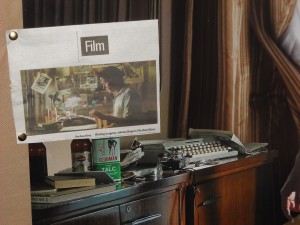The bargain bin at Half Price Books in Berkeley has yielded some literary treasures but since our “In” stack of books is a formidable reading challenge, prudence dictates that any additions to the unread pile should be chosen very judiciously and so, recently, we were leaving the store empty handed. We were wearing some jeans with holes in the knees and must have looked a tad like one of Shattuck Avenue panhandlers which may have inspired a local citizen to engage us in conversation. He quickly cut to the chase (as they say in Hollywood) and delivered the essence of his philosophy of life: “If you want nice things in life (such as the books being sold inside the store), get a job and earn the money to buy them.”
Rather than take a pragmatic approach and respond with some logical facts and statistics about how the nation is in the midst of The Great Recession and jobs are hard to get and hold, we challenged the validity of his premise. What’s wrong with the old song’s belief that “the best things in life are free”? In the specific case of the World’s Laziest Journalist that would include: a ride on the Goodyear blimp (Bucket list item since high school days), a ride on a B-17-G WWII bomber (dittio), a chance to cover the Oscars (ditto again), a 1965 ocean voyage to Casablanca and various European ports of call, and talking our way into a closed automobile museum. Total expenditures: Nada.
He was flummoxed. He had failed to shame us into a painful admission that we were an abysmal failure in a capitalistic society. We travel around having a shipload of fun and are too dumb to realize that we should have embraced Oscar Levant’s concept of the treadmill to oblivion.
There’s an old adage that says anybody who has kids has given hostages to fortune. We may wind up with an anemic memorial service (such as Jay Gatsby’s) but we console ourself with what Hunter S. Thompson said: “Life should not be a journey to the grave with the intention of arriving safely in a pretty and well preserved body, but rather to skid in broadside in a cloud of smoke, thoroughly used up, totally worn out, and loudly proclaiming “Wow! What a Ride!”
Ernest Hemingway, Jack Kerouac, and Hunter S. Thompson wanted to become world famous writers. They got what they wanted and it made them miserable.
The Berkeley Public Library offers a tool library service and the library in Boulder City in Western Australia offers a toy library. Don’t kids go through toys like a voracious reader goes through books? Buying toys keeps the toy factories (“made in China”?) busy and if a kid is going to obsess on his Hoppalong Cassidy holster and cap gun for just a short burst of time, why do the parents have to buy it? A toy library is logical but basically a Communist concept, n’est ce pas? How often do you use the sander that you got for Christmas several years back?
A happy-go-lucky bachelor is the antitheses of family values. A vagabond who can throw all his gear under a hostel bunk and explore exotic locations can easily identify with an Apache who can pick up all the necessities and move on at a moment’s notice but for the father of a modern family, life demands an unchanging home and social structure.
When the (future) World’s Laziest Journalist was warned about the hazards of indolence, we (being of Irish heritage) immediately assessed the value of lazy slobs in society. For one thing, it gives mothers an example for what can happen if a kid doesn’t strive for excellence in kindergarten and all subsequent educational endeavors. Then again, it also reinforces the moralistic message that all good little boys grow up and become responsible citizens and a cinder block for building a solid social structure.
Nonconformists might do more for helping the proles become assured that they have made the correct life decisions than the possibility that they will inspire dissent and unrest.
Who, in their right mind, would want to experience what it is like to stand at a forlorn highway intersection, see no traffic, and realize that a thunder storm will soon leave you cold, wet, and miserable? On the other hand, what diligent father wouldn’t want to read a passage about such a dismal night on the road (at this point hipster know that the disk jockey will play Red Sovine’s song “Phantom 309”) to his kids? There’s a line in a Waylon Jennings song that cheerfully reminds listeners that when life serves you a shit sandwich “at least you got the makings of a song.”
At this point, as the column is being written, the columnist recalls a debate among three neighbors in South Lake Tahoe in the summer of 1970 that tried to determine which is more difficult: life “on the road” or the challenges of working the same job year after year just to provide for a family? The red or the black? Family or Adventures? The Lady or the Tiger?
There is one very dangerous aspect to picking the Jack Kerouac trail to fame and forturne. Well, two, actually. First you might not become rich and the author of best sellers and two: you might become so addicted to the process of collecting material for the greatest autobiography ever written, that you don’t actually write the damn thing. It would be a case of contraccting the wordsmith’s version of “White Line Fever.” WHAT-ev-ah!
One thing is for sure at this point in life. We know we aren’t capable of writing a column that clearly outlines the parameters of the turmoil in the Middle East, let along write a column that (somehow) ends it. Sooooo? This weekend we will not post a week-in-review column, but will provide tour guide service for a fellow who will be visiting the San Francisco Bay area.
You want more? Google “The Myth of the Unbiased Media,” by Robert Gammon in the latest editor of the East Bay Express (dotcom).
Recently a political activist in Berkeley (Ironically the home of the world’s best weapons lab happens to be a city where the peace symbol is ubiquitous) asked us: “Are you in favor of World Peace?” We responded “F*** no! War means jobs.” It also means that we will feel obliged to reassess the situation again next week when the Forever War will again instigate a need for perceptive and insightful (and cynical?) commentary.
The World’s Laziest Journalist realizes that Howard Beal was spot-on in his criticism of the way things are going, but we also realize that if after many years of producing criticism of the system we can get our closest friends to “share” the link to our latest column on Facebook only on rare occasions. We have concluded that the best we can do is adopt the throw the glasses into the fireplace and imitate the philosophy in the “Is that all there is?” song and try to have an “eat, drink, and be merry” fling that would have made the Red Barron proud.
Recently we heard a report on the radio (probably on KCBS) that President Obama was going to rely heavily on scientists for advice on how to contain the threat of an Ebola epidemic and we marveled that the conservative media didn’t quickly ask: “You mean the same loons who cooked up the Global Warming conspiracy theory?”
We expanded our search for the meaning of life to include some (new to us) nineties style pop culture endeavors by activating a DVD player and in a documentary about the life of film director John Huston learned that his modus operandi was to have a much fun as possible. Second the motion.
We have always tried to emulate the people who made “having fun” a leitmotif for their biography. We have even found a way to include that proclivity into a portion of our personal views on theology.
If life is a gift and if the people who seem to enjoy living the most are the ones who have the most fun, then perhaps (we speculate) when we die and face St. Peter on Judgment Day, he will ask everyone the same question: “Did you have fun during your time on Earth?” If the answer is “Yes!” then their reward will be a chance to be reincarnated and have more fun; if they answer “No!” then their punishment will be another go-round to see if they can figure out how important it is to improve their “fun quotient.”
Herodotus wrote “If a man insisted always on being serious and never allowed himself a bit of un and relaxation, he would go mad or become unstable without knowing it.”
Now the disk jockey will play Waylon Jennings “He went to Paris,” the Beatles’ “Follow the Sun,” and Duane Eddy’s “Movin’ N Grovin’.” We have to go buy a “Yes on D Berkeley vs. Big Soda” T-shirt for our history archive. (Dang! We wish we had bought a souvenir T-shirt from the kids who were on strike at Columbia back in 1968.) Have a “Kick on third down!” type week.









On the Road to literary fame and fortune?
What would happen if a group of homeless political activists in Berkeley offered an opportunity for a young journalist to score a scoop and a chance for a career making project? Since a good many energetic authors have endured the rigors of life on the road to write about their experiences, and since Berkeley is considering a list of proposed ordinances that will make being homeless more challenging, Mike Zint, the political activist leading the effort to prevent the historic Berkeley Post Office building from being sold, has issued a challenge to journalists covering the resurgent political scene in the famed University town. He calls it the George Orwell do-it-yourself scholarship program.
Writers ranging from the eager staff of the Daily Californian to contributing writers for various publications, and perhaps even a staff writer for the New York Times are being urged to vie for the privilege of spending a week (or month?) with the 24/7 protest at the city’s main Post Office branch and experience what life without money, regularly scheduled meals or time clocks means.
If a young writer shows up with no money, no ID, and no credit cards and is willing to spend a week (month?) living on the streets gathering material for a writing project, there is no guarantee that the work will sell, but the rookie scribe will be granted membership in a rather exclusive group. The Berkeley chapter of the fraternity of the open road school of journalism has an impressive roster.
Robert Louis Stevenson, who wrote “Travels with a donkey,” and “An Inland Voyage” had a home that is now a California State Park just north of Calistoga.
Dorothea Lange was a photographer who roamed the country taking photos that provided classic images showing the desperate plight of the poor during the Great Depression. She lived in Berkeley CA.
Jack Kerouac made being a bi-coast schizophrenic the basis for the beatnik literary movement by repeatedly bouncing from the Big Apple to Frisco and back again and again and writing about it in various books. He was briefly a Berkeley resident.
Hunter Stockton Thompson rode with the Oakland chapter of the Hell’s Angeles Motorcycle Club and the subsequent book mad him a journalism super-star. He lived, for a while, in San Francisco.
Blogger, former war correspondent, and (more recently) occasional baby sitter, Jane Stillwater, who has circled the glob gathering interesting information and facts, has interrupted her peripatetic fact checking activities and is currently ensconced in Berkeley and is putting the finishing touches on her first novel tentatively titled “Pictures of a Future World.”
Sure, married people can write charming books about domestic bliss but even the lady from Scranton Pa., who wrote “Please Don’t Eat the Daisies,” didn’t stay there.
George Orwell’s first book “Down and Out in Paris and London” never lived in Berkeley but his first book helped establish him as a celebrity writer. The fact that his book about hard times sold well during the depression should provide some incentive for today’s white belt (i.e. beginner) writer to “walk a mile in Orwell’s moccasins.”
If writers can’t get an assignment from the mainstream media to cover the tumultuous atmosphere on Shattuck Avenue in Berkeley it might indicate that the publishers (who are usually conservatives) are more into denial than willing to subsidizing a sojourn into the fascinating world of life on the edge.
If a bold and audacious writer decides to take the challenge, and doesn’t get any response to his work done on speculation, that might be proof that capitalists are practicing de facto censorship in a country that has been conditioned to be oblivious to any limits on freedom of speech imposed by financial considerations. Would capitalistic publishers institute de facto censorship based on misguided fanatical beliefs if it deprived them of a traditional source for sure sales? In the capitalists’ world, doesn’t greed trumps political principles every time?
If such hypothetical self imposed limitations were in effect, wouldn’t the discipline required to resist the urge to break the embargo ultimately fail due to greed fostered by the potential of impressive sales numbers? Hasn’t the life of a vagabond wordsmith been the basis for many literary careers? Publishers may be able to control what is available to buy in America’s bookstores, but they can’t stop people from follow sales trends that have been effective for many generations.
The danger for the capitalistic conservative moguls would be that some desperate graduate of a journalism school, who is being overwhelmed by student debt, cites the WTF factor and puts his world on the line and risks everything on a bold gamble. That makes very interesting reading for those who want to live an exciting life vicariously.
What beleaguered dad doesn’t retreat to his “man cave” and yearn for a proxy who will deliver the life of a happy go lucky, eloquent rolling stone in the pages of a new best seller?
With all the time spent on talk radio decrying the existence of panhandlers in the land of opportunity, there is one glaring factor: when is the last time a conservative talk show host interviewed a homeless person on the air? If the unemployed are not given an opportunity to express their point of view, how then does a one-sided point of view program exemplify a dedication to “fair and balanced” content?
Dirty diapers, puking babies, and Sunday morning sermons may add a comforting predictability to life and adds a shared experience bond to community living but the uncertainty of hitchhiking in the rain on a desolate highway intersection at night does not need to be concerned about being too mundane to hold the audience’s interest. The song “Phantom 309” describes the dismal experience of hitchhiking at night on a remote stretch of highway as a rain storm approaches. For families in fly-over country that song is a “Twilight Zone” episode told in lyrics and is very entertaining, but for someone who has experienced the vagabond lifestyle it provides a “been there done that” moment that rings true for many a wandering wordsmith.
(If the writer’s reaction to the plight is to utter a blasphemy and if it is immediately followed by a dramatic lightening bolt striking the peak of a mountain top about five miles yonder, that will probably be an “ace of trump” incident at a hostel story telling competition.)
The World’s Laziest Journalist has lived the hitchhiking to Frisco chapter of “On the Road” almost five decades ago and has concluded that it is better to interview the regulars at ‘Fort Zint” (the Berkeley Post Office Defense Protest) and get a vicarious look at the challenges they face rather than adopting the young writer’s sense of adventure and putting a major commitment of time and energy into a project that would be done on speculation.
At this stage of the game what would be the use of putting a great deal of time and effort into laying the foundation for a writing career that will stretch thirty years into the future?
We either do something for the S&G factor or we give it an immediate “pass.” That isn’t to say that we would turn down a spur of the moment offer of a ride to NYC – the travel bag is always packed – but road adventures are a young man’s game and, according to Mike Zint’s ground rules wouldn’t getting a monthly social security check take away the risk factor of being broke and on the move?
In “the Road,” former University of California at Berkeley student Jack London wrote: “I located and empty box-car, slid open the slide-door, and climbed in.”
Now the disk jockey will play Clarence “Frogman” Henry’s 1956 hit “Ain’t got no home,” the Eagles’ “Take it easy,” and the Highwaymen’s “The Road goes on forever, the party never ends.” We have to check Craig’s list and see about the possibility of getting a ride to the Big Apple. Have a “never saw a sight that didn’t look better looking back” type week.